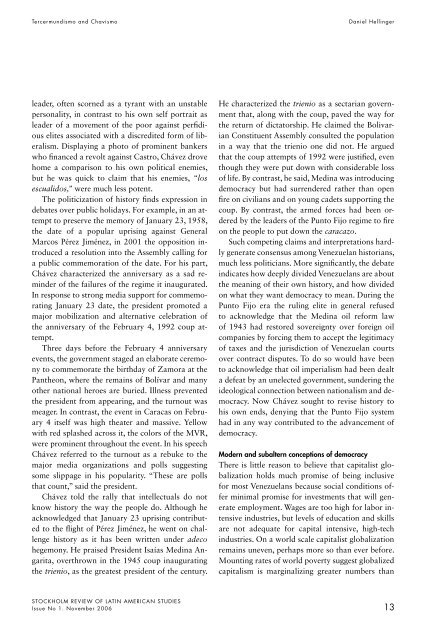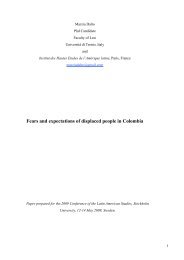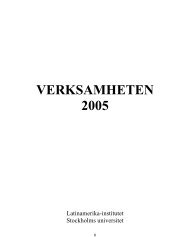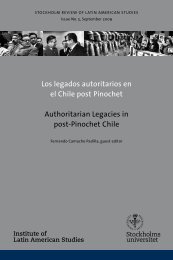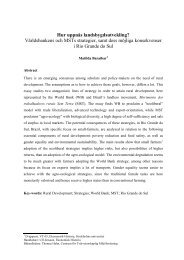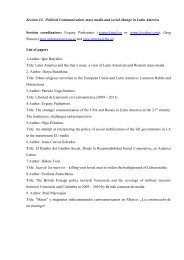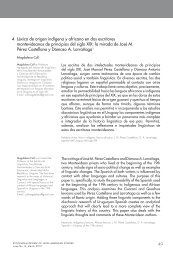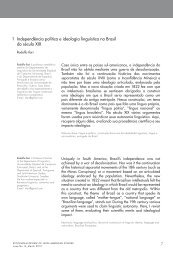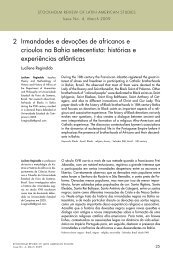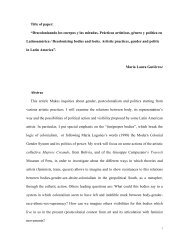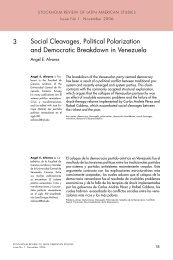Venezuelan Politics and Society in Times of Chavismo PolÃtica y ...
Venezuelan Politics and Society in Times of Chavismo PolÃtica y ...
Venezuelan Politics and Society in Times of Chavismo PolÃtica y ...
You also want an ePaper? Increase the reach of your titles
YUMPU automatically turns print PDFs into web optimized ePapers that Google loves.
Tercermundismo <strong>and</strong> <strong>Chavismo</strong><br />
Daniel Hell<strong>in</strong>ger<br />
leader, <strong>of</strong>ten scorned as a tyrant with an unstable<br />
personality, <strong>in</strong> contrast to his own self portrait as<br />
leader <strong>of</strong> a movement <strong>of</strong> the poor aga<strong>in</strong>st perfidious<br />
elites associated with a discredited form <strong>of</strong> liberalism.<br />
Display<strong>in</strong>g a photo <strong>of</strong> prom<strong>in</strong>ent bankers<br />
who f<strong>in</strong>anced a revolt aga<strong>in</strong>st Castro, Chávez drove<br />
home a comparison to his own political enemies,<br />
but he was quick to claim that his enemies, “los<br />
escualidos,” were much less potent.<br />
The politicization <strong>of</strong> history f<strong>in</strong>ds expression <strong>in</strong><br />
debates over public holidays. For example, <strong>in</strong> an attempt<br />
to preserve the memory <strong>of</strong> January 23, 1958,<br />
the date <strong>of</strong> a popular upris<strong>in</strong>g aga<strong>in</strong>st General<br />
Marcos Pérez Jiménez, <strong>in</strong> 2001 the opposition <strong>in</strong>troduced<br />
a resolution <strong>in</strong>to the Assembly call<strong>in</strong>g for<br />
a public commemoration <strong>of</strong> the date. For his part,<br />
Chávez characterized the anniversary as a sad rem<strong>in</strong>der<br />
<strong>of</strong> the failures <strong>of</strong> the regime it <strong>in</strong>augurated.<br />
In response to strong media support for commemorat<strong>in</strong>g<br />
January 23 date, the president promoted a<br />
major mobilization <strong>and</strong> alternative celebration <strong>of</strong><br />
the anniversary <strong>of</strong> the February 4, 1992 coup attempt.<br />
Three days before the February 4 anniversary<br />
events, the government staged an elaborate ceremony<br />
to commemorate the birthday <strong>of</strong> Zamora at the<br />
Pantheon, where the rema<strong>in</strong>s <strong>of</strong> Bolívar <strong>and</strong> many<br />
other national heroes are buried. Illness prevented<br />
the president from appear<strong>in</strong>g, <strong>and</strong> the turnout was<br />
meager. In contrast, the event <strong>in</strong> Caracas on February<br />
4 itself was high theater <strong>and</strong> massive. Yellow<br />
with red splashed across it, the colors <strong>of</strong> the MVR,<br />
were prom<strong>in</strong>ent throughout the event. In his speech<br />
Chávez referred to the turnout as a rebuke to the<br />
major media organizations <strong>and</strong> polls suggest<strong>in</strong>g<br />
some slippage <strong>in</strong> his popularity. “These are polls<br />
that count,” said the president.<br />
Chávez told the rally that <strong>in</strong>tellectuals do not<br />
know history the way the people do. Although he<br />
acknowledged that January 23 upris<strong>in</strong>g contributed<br />
to the flight <strong>of</strong> Pérez Jiménez, he went on challenge<br />
history as it has been written under adeco<br />
hegemony. He praised President Isaías Med<strong>in</strong>a Angarita,<br />
overthrown <strong>in</strong> the 1945 coup <strong>in</strong>augurat<strong>in</strong>g<br />
the trienio, as the greatest president <strong>of</strong> the century.<br />
He characterized the trienio as a sectarian government<br />
that, along with the coup, paved the way for<br />
the return <strong>of</strong> dictatorship. He claimed the Bolivarian<br />
Constituent Assembly consulted the population<br />
<strong>in</strong> a way that the trienio one did not. He argued<br />
that the coup attempts <strong>of</strong> 1992 were justified, even<br />
though they were put down with considerable loss<br />
<strong>of</strong> life. By contrast, he said, Med<strong>in</strong>a was <strong>in</strong>troduc<strong>in</strong>g<br />
democracy but had surrendered rather than open<br />
fire on civilians <strong>and</strong> on young cadets support<strong>in</strong>g the<br />
coup. By contrast, the armed forces had been ordered<br />
by the leaders <strong>of</strong> the Punto Fijo regime to fire<br />
on the people to put down the caracazo.<br />
Such compet<strong>in</strong>g claims <strong>and</strong> <strong>in</strong>terpretations hardly<br />
generate consensus among <strong>Venezuelan</strong> historians,<br />
much less politicians. More significantly, the debate<br />
<strong>in</strong>dicates how deeply divided <strong>Venezuelan</strong>s are about<br />
the mean<strong>in</strong>g <strong>of</strong> their own history, <strong>and</strong> how divided<br />
on what they want democracy to mean. Dur<strong>in</strong>g the<br />
Punto Fijo era the rul<strong>in</strong>g elite <strong>in</strong> general refused<br />
to acknowledge that the Med<strong>in</strong>a oil reform law<br />
<strong>of</strong> 1943 had restored sovereignty over foreign oil<br />
companies by forc<strong>in</strong>g them to accept the legitimacy<br />
<strong>of</strong> taxes <strong>and</strong> the jurisdiction <strong>of</strong> <strong>Venezuelan</strong> courts<br />
over contract disputes. To do so would have been<br />
to acknowledge that oil imperialism had been dealt<br />
a defeat by an unelected government, sunder<strong>in</strong>g the<br />
ideological connection between nationalism <strong>and</strong> democracy.<br />
Now Chávez sought to revise history to<br />
his own ends, deny<strong>in</strong>g that the Punto Fijo system<br />
had <strong>in</strong> any way contributed to the advancement <strong>of</strong><br />
democracy.<br />
Modern <strong>and</strong> subaltern conceptions <strong>of</strong> democracy<br />
There is little reason to believe that capitalist globalization<br />
holds much promise <strong>of</strong> be<strong>in</strong>g <strong>in</strong>clusive<br />
for most <strong>Venezuelan</strong>s because social conditions <strong>of</strong>fer<br />
m<strong>in</strong>imal promise for <strong>in</strong>vestments that will generate<br />
employment. Wages are too high for labor <strong>in</strong>tensive<br />
<strong>in</strong>dustries, but levels <strong>of</strong> education <strong>and</strong> skills<br />
are not adequate for capital <strong>in</strong>tensive, high-tech<br />
<strong>in</strong>dustries. On a world scale capitalist globalization<br />
rema<strong>in</strong>s uneven, perhaps more so than ever before.<br />
Mount<strong>in</strong>g rates <strong>of</strong> world poverty suggest globalized<br />
capitalism is marg<strong>in</strong>aliz<strong>in</strong>g greater numbers than<br />
Stockholm REVIEW OF Lat<strong>in</strong> American Studies<br />
Issue No 1. November 2006<br />
13


